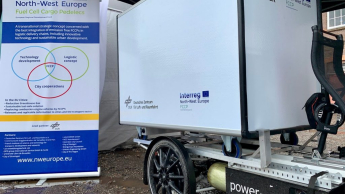You write Issy-les-Moulineaux, you read H2
Cities represent about 4% of the land in Europe, but also the 75% of the population. Obviously, most of them are impacted by congestion, in particular in larger urban areas.
After Brexit, the Paris urban agglomeration remains as the last metropolitan area in the European Union. With its about 9 millions of inhabitants, it suffers of an obvious congestion which has an impact on pollution and environment.
Issy-les-Moulineaux is one of the closest cities to Paris, part of the first inner suburb, and it must deal with this context. Actually, Issy is located in the southwest of the urban agglomeration, not far from the Eiffel Tower.
This medium-sized city is one of the major digital districts for its region and the whole country, as its 72,000 jobs, which exceed its inhabitants (about 70,000), testify.
Due to its conformation, location and economic vitality, Issy needs to be responsive and smart if it wants to fight against climate change.
This is one of the main reasons Issy has adopted a strong political vision towards the fight against climate change, becoming the first French city to launch, in 2020, a specific budget dedicated to climate related actions. The city has the goal to become one of the first city in Europe and in the world to become climate neutral.
In late 2019, Issy was invited by the INTERREG NWE program to join an ongoing project, FCCP.
This was the first step towards a hydrogen-based climate neutrality strategy.
FCCP, what is it?
Since a few years, the magnitude of ecommerce is growing fast as testified by the extreme success of some companies, such as Amazon, Alibaba or Zalando. Those are nothing more than some examples of a new way of selling and purchasing which is taking more and more importance, representing about 15% of purchases in France in 2019.
This trend is growing even faster due to the health crisis due to the breakdown of COVID-19 and the related lockdowns and restrictions that had a key role in pushing a new mindset as well as new behaviors of individuals and new business strategies.
This has disrupted trade related supply chains and caused several logistic related challenges such as growing emissions, congestions and delays in deliveries in cities.
FCCP project builds on an innovative logistic concept, based on the deployment and the test of emission free cargo bikes, with sufficient range and constant performance through all seasons providing significant pal to reduce emissions and congestions in cities and thus to improve livability.
For the development of the used fuel cell technology, 36 FCCPs will be tested for one year through all seasons within various cities in Europe.
Two of those will be in Issy-les-Moulineaux.
Why FCCP in Issy
Issy started to work on hydrogen concretely with FCCP, this has represented an occasion to “learn on the job”, via a living lab strategy, to work with these technologies.
This was considered useful as Issy needed to prove the importance of the use of those vehicles and to provide lessons learnt to the various stakeholders involved (bike and fuel cells manufacturers, hydrogen suppliers) to improve the products and the services.
The tests will then be useful for public authorities themselves, as they will understand how the infrastructures should be adapted to make the use easier.
Actually, the first results are already there as Issy is working on the construction of a hydrogen production and distribution station, one of the very few in France and the Region, which will be coupled with an urban logistic center to ensure a more climate friendly last-mile delivery.
The future
s mentioned, the participation of Issy Média and the city of Issy-les-Moulineaux in the FCCP project is also a way to “launch” the city towards the use of hydrogen for its services.
The city plans to develop a district of the city entirely furbished by hydrogen called HydroSeine in the next years. These urban projects are the next big steps towards innovation in the city of Issy-les-Moulineaux.
The strategy is also to develop new ways of mobility supporting the electrification of the city’s vehicle fleet and discussing about other ways to develop a more responsible fleet towards climate change. The construction of the hydrogen station coupled to the urban logistic center will also increase the number of clean vehicles in the streets of the city whereas the number of polluting vehicles will be lower than ever before.
In this framework, the region Ile-de-France is one of the main partners of the City in various of those projects, including FCCP. There is a strong will at the level of the region to help the whole territory to become climate neutral and also to develop the use of new energies like Hydrogen.
The city of Issy-les-Moulineaux is, further, implicated in different European projects whose aims are to test new solutions for the city. The FCCP Project is clearly part of these with the main objective fully in line with the objectives of the city.
The timing
Issy has launched its first bike (BAYK) during the summer 2021 and it has just launched a second one (Urban Mobility). The first trial with the bikes was conducted without hydrogen, but it is now all set to have the full test. The test will go on up to the spring 2023.
The Team
The City of Issy-les-Moulineaux is working under the lead of its public company specialized in communication, innovation and EU projects, Issy Média. Moreover, Issy can count on the support of FCCP, including the Gustave Eiffel University, the German Aerospace Center and on-the-field expert on EU and living labs (Matteo Satta).
Useful links
Website of FCCP: https://fuelcellcargobike.eu/

